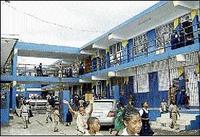Bryan Miller, JIS Writer
A section of the Barracks Road Primary School in Montego Bay, St James, which benefited from the Jamaica Social Investment Fund Western.
Since its inception in 1996, the Jamaica Social Investment Fund (JSIF) has spearheaded numerous programmes to alleviate poverty and boost education quality in under resourced areas.
With the Jamaica Survey of Living Conditions 2005 showing that poverty in Jamaica's rural areas was more pronounced than in the Kingston Metropolitan Area, the need for assistance in rural Jamaica should be a priority for the country's economic planners.
Parishes like Trelawny, St James, Hanover and Westmoreland would certainly fall on the list for any social and economic engineering programme.
A limited liability company incorporated under the Companies Act of Jamaica, JSIF's mission is to "address the immediate social and economic infrastructure needs of underserved communities across Jamaica, in a manner that is quick, efficient, transparent and non-partisan".
The agency has sought to forge partnerships between central and local government, communities and private and public sector organisations.
works in the west
It is interesting, therefore, to take an analytical look at the work of this organisation and highlight some of their achievements. Specifically, let's look at works in the western parishes of Trelawny, St James, Hanover and Westmoreland.
JSIF has approximately 735 projects completed across the island as at December 2007, with its combined monetary input of about $3.3 billion. There is an additional 275 projects that have been approved and at varying stages of implementation, which will require approximately $1.6 billion for completion.
To ensure full community and individual participation in its projects, JSIF requires an input, whether in cash or kind, of between five and 25 per cent of the total cost, dependent on the type of project. As such, community organisations have contributed approximately $500 million to implemented JSIF projects to date.
In western Jamaica, JSIF has completed approximately 174 projects with 89 of these being schools.
It is not by coincidence that the figures are reflected in that ratio, considering JSIF's belief that education is the base from which social and economic progress can be made. With the 174 projects in western Jamaica, research has shown that approximately 94,000 persons stand to benefit directly from them, with another 300,000 benefiting indirectly.
Nationally, some 1.5 million persons have benefited directly from JSIF's implemented projects.
Principal of the Barracks Road Primary School, in Montego Bay, Alonzo Jones, explained that since the improvements carried out at his school, a total culture change towards the institution from teachers, students and persons from the surrounding community is evident because a more conducive teaching/learning environment now exists.
quality development
"Students past, present and otherwise are very appreciative of the quality of the development. They are proud of it, the teachers feel better and are all obviously happier," he said.
According to operations manager at JSIF, Omar Sweeney, the organisation receives donor funds from several different sources, including the European Union, World Bank, the Caribbean Development Bank and the Organisation of Petroleum Exporting Countries, all supplemented by funds from the Government of Jamaica. He described JSIF as a complementary mechanism, working along with other agencies and organisations to achieve a particular goal.
He pointed out that several studies done since the inception of JSIF have revealed that the organisation has achieved its objectives in the short term. But what did JSIF set out to do in the short term?
"For one, we set out to increase the access to education for the early childhood cohort. So, whereas we have invested in the construction of over 200 early childhood institutions since our existence, we would say that we have increased access there. Also, we set out to improve the level of infrastructure in terms of farm roads; after completing over 100 road segments, we could say that we have been able to have some impact there as well," the operations manager confidently stated.
JSIF's assistance, however, is not limited to schools and roads. Agro-processing, counselling centres, health centres, markets, sanitation projects, skill-training infrastructure and equipment, water projects and conflict resolution centres, among others, have been put in place by this organisation. They all make up the more than 1,000 projects approved for implemen-tation to date.
According to Sweeney, since the communities contribute, this helps to secure interest and protection of the projects completed.
"In fact, in 2003, we were able to take it one step further and develop the community-based contracting approach, because not only were communities willing to contribute, but they really wanted to form and drive their own development. So we were able to develop that with the requisite training, where they could actually be totally in charge and JSIF would only sign a financing agreement," said Sweeney.
He said more than 60 projects have been implemented in that way since 2003. This method has helped to build greater community ownership of the projects. He expressed the view that a high level of appreciation is always exhibited for the projects implemented, especially in rural Jamaica.
It is quite evident, therefore, that the work of the JSIF towards poverty eradication will have lasting social and economic impact on the communities. The JSIF is not into feeding the community for a day; it is teaching and preparing whole communities how to fend for themselves for a lifetime.
This is a special Gleaner feature in collaboration with the Jamaica Information Service.

